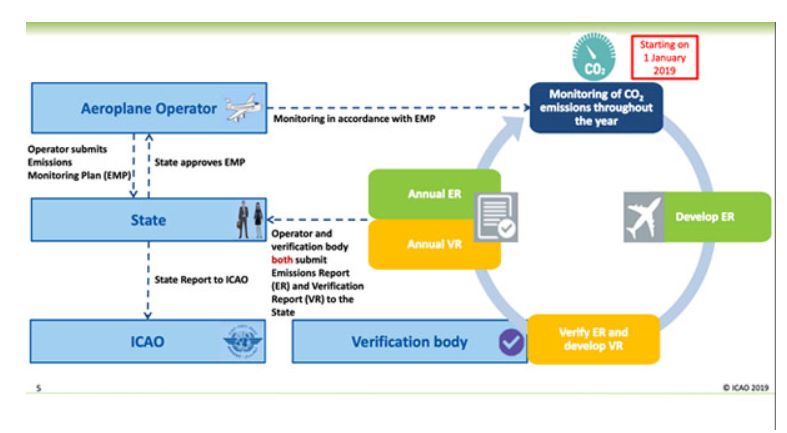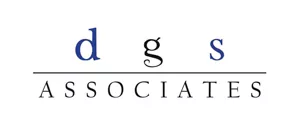Aviation is one of the fastest-growing sources of Greenhouse Gas (GHG) Emissions globally and currently, it contributes to 2.5% of CO2 emissions and 1.9% of all greenhouse gas emissions in the world.1 The need for the reduction of these parameters has been emphasized by the International Civil Aviation Organization (ICAO) which has called for severe disruptions in the aviation sector through the use of clean technology and policy tools to combat climate change.2 In pursuance of this and to meet United Nations Framework Convention on Climate Change (UNFCCC) Paris Agreement's temperature goal, the ICAO has initiated the Carbon Offsetting and Reduction Scheme for International Aviation (CORSIA).
What is CORSIA?
CORSIA is the first global market-based measure that attempts to reduce carbon emissions by aviation. This is done by allowing airline companies to offset CO2 emissions that cannot be reduced through the use of technological improvements, operational improvements, and sustainable aviation fuels with emissions units from the carbon market. Therefore, an airline operator will have to offset all emissions growth from the baseline year of 2019 and 2020.3
How is CORSIA implemented?
The scheme has been introduced in three phases: a pilot phase (2021-2023), a first phase (2024-2026), and a second phase (2027-2035). While the pilot and the first phases are voluntary, the second phase is mandatory for all countries. 115 countries have currently agreed to participate in CORSIA and 4 more States (Seychelles, Sierra Leone, Solomon Islands, and Mauritius) announced their intention to participate from 1 January 2024.4 The scheme applies to countries with airplane operators of international flights.
What is India's position on CORSIA?
India decided not to participate in the voluntary phases but has recently announced its intention to be compliant by the mandatory phase in 2027.5 In pursuance of this, the Directorate General of Civil Aviation in India has introduced Civil Aviation Requirements for CORSIA,6 which incorporates the scheme of CORSIA into Indian law and ensures compliance by airline operators.
Additionally, DGCA has also issued several guidance materials and workshops for airline operators and other stakeholders for a better understanding of the design elements of CORSIA and has empaneled two verification bodies (Bureau Veritas India Pvt. Ltd. and TUV India Pvt. Ltd.)7 duly accredited by National Accreditation Board for carrying out CORSIA data verification.8
Who is responsible under CORSIA?
CORSIA ascribes responsibilities to airplane operators and the country to which the operator is attributed. An airplane operator shall attribute itself to a country and the country shall ensure such correct attribution.9 The correct attribution is determined by which country has issued an ICAO designator or Air operator certificate. In case neither exists, it shall be the place of juridical registration.
Presently, the airplane operators attributed to India are Air India, Air India Express, Go Airlines (India) Ltd., Interglobe Aviation Ltd. (Indigo), Spicejet and TATA SIA Airlines Ltd. (Vistara). These operators must identify their flights operating on international routes. It is relevant to note that under CORSIA, two or more consecutive international flights, operated under the same flight number, are considered separate flights. These operators must send this information to DGCA who shall conduct magnitude checks for carbon offsetting.
It is also relevant to note that while India is not participating in the voluntary phases, Indian airline operators flying between volunteering countries will nevertheless be subject to offsetting requirements, irrespective of India's participation.
How can CO2 emissions growth be offset under CORSIA?
To offset CO2 emissions growth, an airplane operator will have to purchase and 'cancel' eligible carbon emission units. Presently, the eligible emissions units for 2021 to 2023 compliance period include units from the American Carbon Registry, Architecture for REDD+ Transactions, China GHG Voluntary Emission Reduction Program, Clean Development Mechanism, Climate Action Reserve, Forest Carbon Partnership Facility, Global Carbon Council and The Gold Standard, Verified Carbon Standard. The eligible emissions units for 2024 to 2023 compliance period are units from American Carbon Registry and Architecture for REDD+ Transactions.10
Airplane operators may also reduce its offsetting requirements through the use of CORSIA eligible fuels, which include CORSIA sustainable aviation fuels and CORSIA lower carbon aviation fuels. CORSIA sustainable aviation fuels are renewable or waste-derived aviation fuels that meets the CORSIA Sustainability Criteria and CORSIA lower carbon aviation fuels are fossil-based aviation fuels that meets the CORSIA Sustainability Criteria.
What are the compliances for airplane operators?
Airplane operators have to comply with the CORSIA standards and provide information as required for the government's compliance with its obligations. All airplane operators are under an obligation to Monitor, Report and Verify (MRV) its annual CO2 emissions. Monitoring must be using the Fuel Use Monitoring Method11 or CORSIA's CO2 Emissions and Reporting Tool (CERT).12 The reporting will also have to be vide an Emissions Report and the airplane operator will also have to attach a Verification Report issued by a verification body engaged by it. The verification body will ensure compliance with ISO 14064-3:2006.
Thereafter, depending on the carbon emission allocation, the airplane operator will also have to purchase and cancel emission units and Monitor, Report and Verify the cancellation vis-a-vis the reporting country.
What are the compliances for a country?
A country's responsibility is to ensure the compliance of airplane operators to the CORSIA standards [laid down in the Annex 16- Volume IV]13 and regularly report CORSIA-specific information and data to ICAO with respect to airplane operators attributed to it.

Additionally, the country will also have to allocate the carbon emissions required to be offset in accordance with the prescribed formula.
Why is India not participating in the voluntary phases of CORSIA?
India has expressed the challenge of developing States like itself, in compliance with the CORSIA requirements. For instance, the baseline year criterion (2019-20) does not permit the growth of the country's underdeveloped aviation sector. Therefore, by joining in 2027, airlines in India will get time to grow more and not face any financial consequences due to CORSIA by joining voluntary phases. This is especially relevant with several of India's main airline operators like GoAir and Jet Airways facing insolvency threats due to operational liabilities.
Footnotes
1 https://www.weforum.org/agenda/2022/12/aviation-net-zero-emissions/#:~:text=For%20many%20of%20us%2C%20the,aircraft%20powered%20by%20jet%20gasoline. ; https://ourworldindata.org/co2-emissions-from-aviation#:~:text=Aviation%20accounts%20for%202.5%25%20of%20global%20CO2%20emissions&text=Most%20flights%20are%20powered%20by,to%20CO2%20when%20burned.
2 https://www.icao.int/environmental-protection/Documents/ICAO%20Environmental%20Report%202016.pdf
3 https://www.icao.int/environmental-protection/CORSIA/Documents/CORSIA%20Annual%20SGF_Oct2022.pdf
4 https://www.icao.int/environmental-protection/CORSIA/Documents/CORSIA%20States%20for%20Chapter%203%20State%20Pairs_3Ed_web.pdf
5 https://pib.gov.in/PressReleasePage.aspx?PRID=1920505
6 http://164.100.60.133/misc/draft%20cars/D10C-C1(Draft_Sept2018).pdf
7 https://www.icao.int/environmental-protection/CORSIA/Documents/CCR%20Info%20Data%20Transparency_PartI_Dec2022_web.pdf
8 https://pib.gov.in/PressReleasePage.aspx?PRID=1780858
9 https://www.icao.int/environmental-protection/CORSIA/Documents/CORSIA_AO_to_State_Dec2022_web.pdf
10 https://www.icao.int/environmental-protection/CORSIA/Documents/TAB/CORSIA%20Eligible%20Emissions%20Units_March2023.pdf
11 
12 https://www.icao.int/environmental-protection/CORSIA/Pages/CERT.aspx
13 https://www.icao.int/environmental-protection/CORSIA/Pages/SARPs-Annex-16-Volume-IV.aspx
The content of this article is intended to provide a general guide to the subject matter. Specialist advice should be sought about your specific circumstances.


